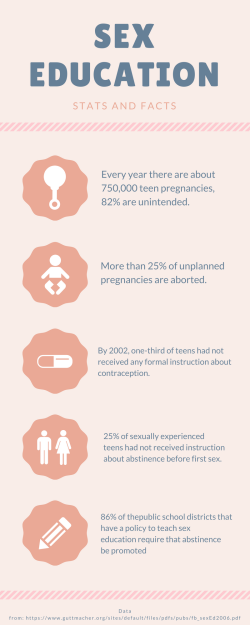Sex is great.
But…
From STIs to STDs, there are plenty of factors that can go wrong.
And, specifically in heterosexual intercourse, one of those mishaps can be an unplanned pregnancy.
Evolution of Sex Education
Ever since the years of the baby boomers, teen pregnancy has been an ongoing decline.
According to the National Center for Health Statistics, the birth rate in the United States has dropped below 25 births per 1000 teen females, specifically between the ages of 15-19.
That is approximately a 25 percent decrease from the 1957 statistic of 96.3 per 1000.
Sex education of the 1950s and the 1960s was more about solidifying gender roles and family structure than preventing an unwanted pregnancy or preventing disease transmission or infection between sexual partners.

Even though oral contraception was around in the 1960s, more than half of the states in the US banned unmarried women from having access to it. It was not until 1972 that women, regardless of their marital status, were granted access to the drug
With a shift in education and legality, the focus has moved onto areas such as pregnancy.
Instead of preaching abstinence, today’s sex education for teens is more focused on practicing safe sex, decreasing the spread of diseases and preventing unplanned pregnancies.
A recent survey found that more than 79 percent of girls and 84 percent of boys used a contraceptive method the first time they had sex.
Types of contraception include condoms and dental dams to oral contraception and the pull-out method.
According to Planned Parenthood, there are 18 contraceptive options for couples.
Access to Sex Education
Up until the 1960s, there were varying types of discussions regarding sex education in schools. But, in the 1960s officials wanted to completely rid if from school’s curriculum.
In terms of education now in the United States, only 24 states make sex education mandatory for students and only 34 states require HIV education.
The Guttmacher Institute reports that currently, “Only 55 percent of young men and 60 percent of young women received formal instruction about methods of birth control.”
Today’s classes help students make better decisions in regards to sex or their sexuality.
Some of these methods include contraceptive pill or injection, intrauterine device and sub-dermal implant. The contraceptive pro-choice project was launched to promote the use of these contraceptive methods and reduce unintended pregnancy.
When a Pregnancy does occur
Despite having sex education, unplanned pregnancies occur.

Zennani Givens, a 21-year-old single mother, was a year younger when she found out she was pregnant. Givens’ world was at a stand still when she received the news.
“There’s so many feelings crashing into each other it’s hard to pinpoint just one until you calm down,” Givens said.
Zenani was very scared and did not know what reaction to expect from family and friends since she was not an established adult.
Givens felt as though she didn’t want to let anyone down. But, there was never a doubt as to if she made the right decision to keep her baby.
“I feel like I definitely made the right choice by keeping my child and not terminating the pregnancy,” Givens said. “The child didn’t ask to be here so why take that from them?.”
Givens always focused on her personal values more than anyone else’s. She had the chance to start a career in the military but knew the pregnancy would put a hold on things.
“My personal values played a big part on this decision knowing I want to further my career in the military and wanting to have kids. Postponing the military would determine if I really wanted to go active duty or not, even down to getting shipped out. So the timing was perfect,” Givens said.

Givens made sure she knew everything that was needed to be the best mother she could be.
“Most of my resources came from my hospital. They put me where I need to be and let’s me know what needs to be done,” Givens said.
Motherhood has been a true journey for Givens.
“My experience is just plain out unreal knowing I’m a parent to a beautiful healthy baby girl. She’s showing me what love really is,” Givens said.
Although she has had to make many sacrifices, she feels that she has all of the support she needs.
“You definitely need a positive mind and vibe from your loved ones to get through pregnancy and after,” Givens said.
Contraceptives pills not only prevents pregnancy, but the hormones prevent ovulation.
Givens did use contraceptives but feels as though they are not very effective.
Society and culture have a major role on why sex education needs to be forced into schools.
The media has a great impact on teens who watch television programs, such as Teen Mom and 16 and Pregnant.
These shows follow the daily life of a teen mom and how it affects them. This can be positive or negative because it gives the mothers more popularity but also shows how much they regret it.
Along with those shows many other media sites influence sexuality. Everything people learn about sexuality is from their culture, beliefs, and even religion. When one is not taught how to react to these beliefs they may become confused.
“Our choices in life are limited by our surroundings,” Dr. Kathleen Mckinley said.



